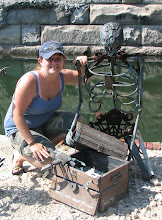In class we discussed the concepts behind pre-1920s films and the metaphors that would have been used to make people understand such a revolutionary concept. Since we didn’t see any in class, I got on YouTube and looked up some old films from the Lumiere brothers and the magician Melies. The short films were nothing exceptional by today’s standards (I’m pretty sure even my high school’s student-produced TV channel had better quality), but the purity and simplicity of them were striking. I was slightly overwhelmed by it actually. There I was sitting at my laptop, hacking into a wireless internet signal from my neighbor’s house, watching one of the first films ever made. To the people watching that 50 second film when it first debuted, it was like magic. And there I was watching it over a hundred years later in a completely different format, thinking “Why would anyone pay to watch such common activities? People getting on a train is hardly entertaining.” It was truly flabbergasting to imagine never having seen a moving picture before, but when theater is the closest thing you’ve ever seen, I guess the mystery of film is understandable.
I actually found the magic of Melies quite funny, even though the “magic” of it is a basic film technique that my brother and I used in home videos as kids. Stopping the film is such an easy way to edit footage out and make things disappear, but at the time viewers probably thought he really was making women disappear and teleport around the set. The Conjuror video I watched was entertaining even to me and my family, so people then must have truly been floored by it. I was amazed that a film that advanced was even around at the turn of the 20th century. Melies must have been both the David Copperfield and Steven Spielberg of his time. His works were probably the epitome of cool for that time, because while seeing real-life actions on film was a rush for everyone, seeing a woman disappear on film would have been truly jaw-dropping, heart-stopping family entertainment. The amazement some people must have felt would probably have been comparable to how Harry Potter felt when he found out he was a wizard, or how Frodo felt in The Lord of the Rings when Gandalf explained the quest he had to take. The sheer wonder of having a whole new world open before your eyes is unfathomable, so while early films didn’t exactly transport you to a magical, fictional land as it seems some movies do today, for the people seeing pictures move for the first time it had to seem that way. In retrospect, the originators of film did open up a new world though, because look how far the technology has advanced in just over a hundred years.
Subscribe to:
Post Comments (Atom)

Is this opening up of worlds of possibility part of what makes something cool?
ReplyDeleteVery interesting and entertaining blog entry. I'm curious if you think you've had an experience comparable to that audiences would have had for the first movies?
ReplyDeleteVery nice addition of hyperlinks to add depth to your blog. Be sure to break up paragraphs for easier reading, though.
Yes, F John, I really think it is in some respect. Most truly cool things do bring with them a wide array of possibilities as far as furthering their initial steps or even giving life to entirely new ideas.
ReplyDeleteAs for an experience I've had that could be compared to those audiences, I think their feelings might have been close to how I felt the first time I stood on the edge of the Grand Canyon and looked down into it. I was truly in awe thinking of how it formed over time and just by the sheer beauty and vastness of it. Another example would be when my mom's parents both died. While that wasn't an amazingly happy time for me, it was equally as overwhelming because it was the first time I ever had to face death and imagine all that comes with it.
I loved The Conjuror! That man was really good with a camera. Just imagining the shock and amazement of people when they saw that movie, I wonder how they would have reacted to a film from today? It is amazing were film started and how far it has come.
ReplyDelete